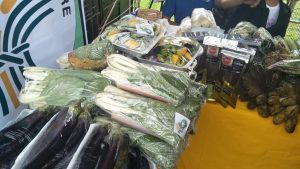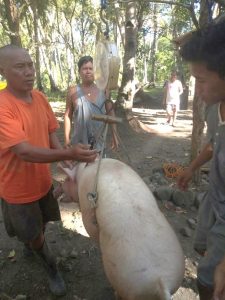It was in January 9, 2020 when the World Health Organization (WHO) reported that a novel coronavirus was identified by Chinese authorities. Subsequently, WHO declared COVID-19 as pandemic and considered as public emergency of international concern.
Conditions incumbent on the present pandemic has brought some difficulties for Filipino farmers, such as limitation in the movement of products. Although measures were set for the unhampered delivery of food supplies, the implementation and interpretation of rules at the local government unit level became a hindrance, especially for smallholder farmers who rely on consolidators or middlemen, because market hubs, such as malls, supermarkets, etc. were locked down.
In this time of crisis, the Special Area for Agricultural Development (SAAD) Program saw to it that the welfare of farmers was prioritized to ensure an efficient flow of food supply from the farm to all Filipino households. The SAAD assisted in the establishment of community loading posts or “tabo” (informal markets), accreditation of food producers and suppliers, financial assistance system, and facilitation of delivery services of agricultural produce through the issuance of food lane pass. These proved to have greatly benefited farmers, not necessarily limited to SAAD beneficiaries.
More importantly, the aggressive promotion of integrated farming to augment their income and productivity has been continually pursued.
Despite one of the hardest affected by crisis, SAAD farmer–beneficiaries still went to great lengths of providing healthy food for the populace during this pandemic. They who are actively engaged in food production are prepared, and adequate measures were set to make them productive and resilient in this times of crisis.
 On April 20, 2020, two farmers’ associations delivered assorted vegetables worth Php 5,897.50 to the Kadiwa Center established by the Department of Agriculture–Regional Field Office 8. Customers, mostly government employees, were able to buy fresh, safe, and cheaply priced okra, pipino, ampalaya, Baguio beans, hot chili, and bell pepper, produced by the Cansoso Livelihood Association of Workers (CLAW) of Matag–ob, Leyte and Bulod Integrated Farmers Association of Sta. Fe, Leyte.
On April 20, 2020, two farmers’ associations delivered assorted vegetables worth Php 5,897.50 to the Kadiwa Center established by the Department of Agriculture–Regional Field Office 8. Customers, mostly government employees, were able to buy fresh, safe, and cheaply priced okra, pipino, ampalaya, Baguio beans, hot chili, and bell pepper, produced by the Cansoso Livelihood Association of Workers (CLAW) of Matag–ob, Leyte and Bulod Integrated Farmers Association of Sta. Fe, Leyte.
 In Southern Leyte, a total of 27 fattened pigs were sold by SAAD swine producers to local butchers and wholesalers. The Sto. Niňo integrated Crops Farmers Association of Brgy. Sto. Niňo, Bontoc sold 15 pigs totaling to 1,110 kilograms (kg) live weight. At Php 120.00 per kg, the group was able to earn Php 133,200. On the other hand, Magaupas Farmers and Fisherfolk Association of Brgy. Magaupas, Liloan had aggregate sales of Php 115,170 at Php 110.00 per kg live weight for 12 pigs sold (1,047 kg).
In Southern Leyte, a total of 27 fattened pigs were sold by SAAD swine producers to local butchers and wholesalers. The Sto. Niňo integrated Crops Farmers Association of Brgy. Sto. Niňo, Bontoc sold 15 pigs totaling to 1,110 kilograms (kg) live weight. At Php 120.00 per kg, the group was able to earn Php 133,200. On the other hand, Magaupas Farmers and Fisherfolk Association of Brgy. Magaupas, Liloan had aggregate sales of Php 115,170 at Php 110.00 per kg live weight for 12 pigs sold (1,047 kg).
Being one of the African Swine Fever (ASF)–free regions in the country, the timely marketing of fattened pigs helped mitigate the shortage of pork supply in the area while the COVID-19 lockdown was enforced. Other regions have now signified their intent to import pigs from Southern Leyte produced by SAAD farmers because they are certified safe and of good quality.
Ecological agriculture farmer Jon Sarmiento said, “Anumang sakuna – bagyo, tagtuyot, o kahit itong COVID-19, ang magsasaka ay hindi mapigilan sa misyon nitong lumikha ng pagkain para sa mamamayan.” (In whatever calamity there is, be it typhoon, drought, or even this COVID-19, the farmer cannot be prevented in his mission to produce food for the Filipino people.)###
Writer: Michael Dabuet, SAAD RPMSO 8


Comments (0)